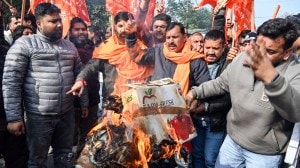Stay updated with the latest - Click here to follow us on Instagram
SC seeks govt’s view for framing guidelines for hotel security
The Supreme Court sought response from the Centre on the need for laying down security guidelines to protect and thwart terror attacks on hotels like Oberoi Trident and Taj in Mumbai.
The Supreme Court on Friday sought response from the Centre on the need for laying down security guidelines to protect and thwart terror attacks on hotels like Oberoi Trident and Taj in Mumbai which bore the brunt of 26/11 strikes.
The apex court also issued notices to the Maharashtra government and the East India Hotels Limited,owners of Oberoi Trident,and Indian Hotel Company Limited,owners of Hotel Taj in Mumbai,on a petition filed by victims of the Mumbai attacks contending that they were liable to provide adequate compensation for loss of lives.
A Bench comprising Chief Justice K G Balakrishnan and Justice B S Chauhan,which at first was reluctant to entertain the PIL,agreed to examine the issues after advocate Meenakshi Arora answered all queries to its satisfaction.
The PIL was filed by Mumbai-based Sarla Parekh,Sevanti Parekh,Vijay Kumar Motilal Agarwal and Srichand D Chhabria,who lost their kin during the attacks.
Arora,who appeared for them,had to answer a volley of questions to satisfy that fresh look has to be given to the security and safety of guests at hotels across the country and under the law all hotels should have public liability insurance to provide compensation to victims of such attacks.
“How can you expect policemen inside the hotels? What type of protection you are seeking for the guests? Have you ever come across any hotel where police are standing at the doors of the hotel,” were some of the questions asked by the Bench.
Undeterred by the questions,Arora submitted that the petitioners are not asking for stationing of the police force but for laying down guidelines for internal security and safety of guests.
She said security guidelines could be how could be the landscaping in and around the hotel,in house training for the staff and some places could be earmarked as safety area.
The advocate also apprised the the Bench about the provisions of the Public Insurance Liability Act which could be made applicable in cases of accidents and terror attacks on hotels.
“It is the duty of the hoteliers to ensure the safety and security of its guests and,for this purpose,to formulate and implement a comprehensive security programme and upon failure to do so hotels are required to be held liable for gross negligence,” she said.
She submitted that there should be some guidelines for internal security in the hotels to provide safety and security to the guests and hotels staff should also be trained to meet such emergency situations.
“The entire nation has witnessed a sustained increase in terror attacks and terrorists expanding their activities to many other places and have realised that hotels in India are soft targets for carrying out such attacks since there are no security regulations for hotels,” the petition said.
Pointing out the alleged lacunae evidencing gross negligence shown by the two hotels,the petitioner sought appointment of expert committee to find out quantum of compensation from them for kith and kin of the family of the victims of the Mumbai attacks.
“An expert or expert committee be appointed to look into the question of quantum of compensation to be paid by the Oberoi and Taj hotels to the legal heirs of the deceased and the injured persons for awarding appropriate sum,” the petition said.
Arora said it was not clear as to how the Maharashtra government was computing the compensation by providing the check of Rs five lakh to the family of the deceased.
“Somebody has to determine the amount of insurance,” she said.







